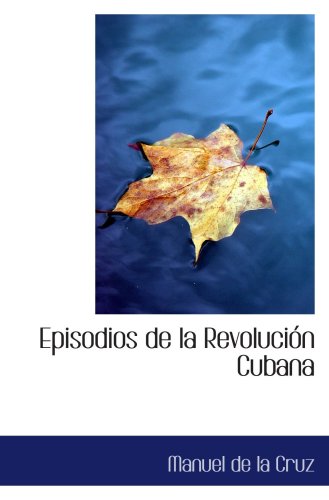3.5.5 Episodes of the Cuban Revolution, a work published in 1890 by Manuel de la Cruz

Manuel de la Cruz (1861–1896), who had already made his mark in journalism, with texts sent from Spain to “La Habana Elegante” and others published in “La Ilustración Cubana” and “El cubano”; was the author of a work published in 1890, entitled “Episodios de la Revolución Cubana.”
This work, unlike most of the texts cited, does not represent the author’s direct experience but rather collects stories from its participants, sculpted from an aesthetic and narrative point of view, with a certain stylistic intent that does not contradict the revolutionary purpose of the work.
The realism of the episodes is recreated in agile brushstrokes, with a romantic tone that focuses on both collective sacrifice and individual, anonymous courage, offering a vivid view of the War while also pointing to the awakening of the clouded national conscience through the evocation of past heroism and the latent possibility of triumph.
He was also interested from a literary point of view in the personalities of the heroes who were the protagonists of the national epic, in this sense he left unpublished part of a biographical sketch about Ignacio Agramonte, for whom he professed genuine admiration, due in part to his ideas on social organization.
He argued with Cirilo Villaverde regarding the figure of Narciso López, whom he considered a rooted annexationist, without taking into account the nuances of the latter’s conduct and the courage he displayed in his conspiratorial actions, despite his erroneous ideological position.
He collaborated closely with José Martí in the preparations for the Necessary War, and his writings even drew positive appraisals from the Apostle, both for their literary quality and for the implicit revolutionary exhortation they embodied. Regarding “Episodes of the Cuban Revolution,” he once stated: “You should have prepared your horses; because reading that, for anyone of any blood, is like riding a horse.”
Although this text constituted the core of his testimonial and revolutionary literature, throughout his political career he deployed intense separatist propaganda, also reflected in the pages of “El Fígaro,” “Revista cubana,” “El país,” “El almendares,” “El porvenir,” and “Patria.” He used the pseudonyms “An Academic of the Language,” “The Academic of Banes,” “Isaías,” “A Frequent Contributor,” “Emanuel,” “Juan de las Guásimas,” “Micros,” “A Westerner,” “An Editor,” “Raimundo Rosas,” “Juan Sincero,” and “Bonifacio Sánchez.”








